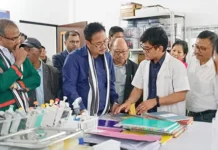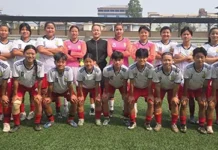[Amar Sangno]
ITANAGAR, 7 Mar: As the entire globe celebrates International Women’s Day on Tuesday, calling for a world free of gender bias, stereotyping and discrimination, and seeking equitability and inclusiveness, our state, Arunachal Pradesh, is battling to gel with the rest of the world in upholding gender equality, especially in student politics.
Student politics have remained a centrifugal force in the state’s politics, with student unions often playing the principal opposition party’s role in Arunachal. However, be it mainstream politics or student politics, the women are always underrepresented.
On being asked, the All Arunachal Pradesh Students’ Union’s (AAPSU) women’s wing president Bengia Mepu opined: “Nagging family members, society and moral burden being shouldered by womenfolk are some of the reasons. The women have to strangulate their political aspirations, be it mainstream or student politics.”
The women’s wing is a reserved seat for the women representatives in the AAPSU, in order to encourage women’s participation in the state’s apex student body’s politics. It is learnt that, over the decades, no woman candidate has ever attempted or expressed desire to lead the union from the top post.
Mepu further said that the AAPSU’s image and aura entirely revolves around masculinity as lots of field works and physical exercises are required.
“In fact, student politics require masculinity and field works in which womenfolk are biologically lacking behind,” Mepu said, adding that, as far as administration and policymaking are concerned, women are far better than their male counterparts.
“It is easy to jump into the fray in student politics, but to survive till the official tenure is over is hard to do. There are many factors for gender inequality in student politics, in which financial involvement is one factor,” she said.
Denying that the union’s fundamental principle and structure are male-centric, AAPSU general secretary Tobom Dai said, “There is no barrier or restriction for female representatives to contest or hold top posts. Perhaps it is due to lack of interest among the womenfolk that the women are underrepresented in the state’s apex students’ organisation.”
“If they are interested, I don’t think anybody would stop them,” Dai added.
Renowned woman activist Jarjum Ete opined that females are neither assertive nor aware, which is the reason why the males in student bodies continue to be patriarchal, and the community bodies perpetuate the patriarchal values.
“I think, at a younger age, and at community levels, females are not at all assertive or aware, and males are not as sensitive. So, males in student bodies continue to be very patriarchal and those in community bodies get to perpetuate patriarchal values unhindered,” Ete said.
All Nyishi Students’ Union president Nabam Dodum argued that student politics are not attractive to women, especially bright female students, and that their families do not support them in getting involved in student politics.
“Normally, student politics do not attract bright female students. They are not interested, and even if they are, the family members do not allow them. Perhaps the women’s responsibilities towards the family or household have always been larger than that of the males in the tribal society,” Dodum said.
He added that “a negative perception is building over the current student politics, as the student organisations have lost their charm, unlike they used to have in the early days.”
Breaking the barrier, the Upper Subansiri District Students’ Union elected a female candidate, Yade Natam, as its president. This is not only a rare development but left the pundits of student politics awestruck.
“Despite poor performance of women representatives in the past, we are witnessing a new breed of women representatives in student politics and in civil society organisations, but one can’t say the same about electoral politics. The patriarchal society that we are in is yet to accept a vocal and outstanding woman as their elected representative,” said Eastern Sentinel Managing Editor Kenter Joya Riba.


